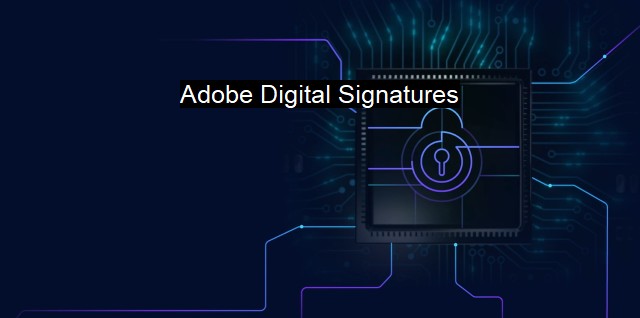What are Adobe Digital Signatures?
Adobe Digital Signatures: Enhancing Cybersecurity and Antivirus Measures for Protected Document Transactions
Adobe Digital Signatures is a feature integrated within Adobe’s suite of tools, specifically Document Cloud, which includes the well-known software, Adobe Acrobat. These signatures are used to guarantee the authenticity of digital documents, ensure data integrity, and confirm the identity of the signee, thus providing a layer of security and accountability.Adobe Digital Signatures utilize a cryptographic protocol employing the use of Public Key Infrastructure (PKI) technology. This digital certificate-based PKI system uses a two-key, asymmetric process. In this system, there is a public key for encryption and a private key for decryption to prevent unauthorized access to information.
When a signature is crafted in Adobe using the digital signature feature, the author's private key is used to generate the digital signature for the document. This private key is specific to the author and should only be accessible by them, hence adding another layer of security.
Next, the application uses a cryptographic hash to generate a sort of digital fingerprint of the document, which is unique to each file. When changes are made to a document, the hash will also change, alerting the system to any unauthorized modifications. The original hash will not match the updated hash, signalling the discrepancy.
Now, when an individual receives a digitally signed document, their system will analyze both the signature and the document’s hash. The user's system uses the sender's public key linked to the sender’s private key (originally used for signing the document) to decrypt the signature, creating a hash that should match the document's original hash. If the hashes coincide, authenticity and integrity of the document are confirmed. if they do not match, the document may have been tampered with after it has been signed, indicating potential security breaches. Therefore, Adobe's digital signature provides a safeguard against unauthorized alterations and identity misrepresentation, ensuring only the genuine signer has access to and control over the document.
Beyond the technicalities, Adobe Digital Signatures are an essential tool in a world increasingly dependent on digital transactions. In sectors such as legal services, governmental agencies, and corporations, document indisputability is paramount. Digital signatures give these institutions the ability to authenticate the parties involved in signing a document, validate its contents, and establish culpability when required.
From the antivirus perspective, Adobe's digital signatures also increase protection against malicious threats that can fundamentally alter documents or phish for sensitive information. By employing these signatures, individuals can verify that documents they receive are from trusted sources, yearning the software safer against malware and phishing attacks.
This trust factor substitutes the requirement to open unknown files or click suspicious links that can lead to risks like viruses, malicious software, or ransomware. Put succinctly, Adobe Digital Signatures ensnare the execution of unknown, possibly dangerous file operations, sterilizing and essentially rendering idle the usual entry points of many contemporary threats.
Adobe Digital Signatures serve as an effective protective shield in the cybersecurity sphere. By ensuring the authenticity, integrity and non-repudiation of digital documents, they allow users to securely exchange information over the internet. Therefore, Adobe Digital Signatures prove instrumental in negating misrepresentations, leaks, data tampering and other potential security risks, thereby elevating the caliber of document security in the digital sphere.

Adobe Digital Signatures FAQs
What is an Adobe digital signature?
An Adobe digital signature is a type of electronic signature that is used to authenticate the authenticity of a digital document. It is a secure way to sign, certify, and approve documents, ensuring they have not been tampered with or altered in any way. Adobe digital signatures comply with legal requirements and are widely accepted in industries such as finance, healthcare, and government.How does an Adobe digital signature protect against cybersecurity threats?
Adobe digital signatures offer several layers of protection against cybersecurity threats. The signature verifies the identity of the signer and ensures the document has not been tampered with. The signature is also encrypted, meaning hackers cannot easily manipulate the signature without access to the signer's private key. Additionally, Adobe digital signatures are often used in conjunction with antivirus software to ensure documents are not infected with malware.Are Adobe digital signatures legally binding?
Yes, Adobe digital signatures are legally binding in many countries, including the United States and European Union. They comply with various e-signature laws, such as the Electronic Signatures in Global and National Commerce Act (ESIGN) and the EU eIDAS regulation. Adobe digital signatures provide legal evidence of the signer's intention to sign a document and comply with all necessary legal requirements.Can Adobe digital signatures be used on mobile devices?
Yes, Adobe digital signatures can be used on mobile devices. Adobe Sign, for example, is a mobile app that allows users to sign documents electronically using their smartphone or tablet. Adobe Sign is compatible with iOS and Android devices and provides the same level of security and legality as traditional Adobe digital signatures.| | A | | | B | | | C | | | D | | | E | | | F | | | G | | | H | | | I | | | J | | | K | | | L | | | M | |
| | N | | | O | | | P | | | Q | | | R | | | S | | | T | | | U | | | V | | | W | | | X | | | Y | | | Z | |
| | 1 | | | 2 | | | 3 | | | 4 | | | 7 | | | 8 | | |||||||